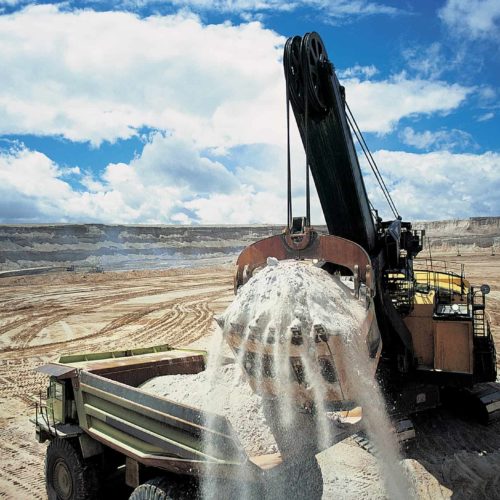Introduction
The federal loan program created for small businesses waylaid by the coronavirus has endured heavy criticism for steering money to some large corporations.
But there’s another flaw: The U.S. Small Business Administration also issued loans to companies with longstanding financial problems unrelated to the virus.
Ur-Energy is one of those companies. For much of the last decade, the mining company has lost money on its Wyoming operations, which supply uranium to America’s nuclear power plants. Ur-Energy’s financial woes are not directly related to the rapid spread of COVID-19, the disease caused by the coronavirus, according to its financial filings.
Nevertheless, the SBA gave a $893,300 loan to two Ur-Energy subsidiaries to cover employees’ salaries and benefits — including its top executives, each of whom makes hundreds of thousands of dollars a year. The SBA didn’t wait long, either, as the Ur-Energy subsidiaries got their money in April, during the first round of loans made under the Paycheck Protection Program, designed to help companies hit hard by the economic fallout from the COVID-19 pandemic. The Casper Star-Tribune was the first to report the story.
Critics say that phase of the program, during which $349 billion was authorized, lacked safeguards to ensure the nation’s neediest companies received loans before large, publicly traded companies that have access to private funding or other companies whose finances aren’t directly affected by the coronavirus.
A second round of Paycheck Protection Program loans, which the SBA is issuing now, requires companies to certify that their loan request is necessary, without specifying if it is related to COVID-19. Guidance from the agency says, “It is unlikely that a public company with substantial market value and access to capital markets” could say that a PPP loan is necessary.
Ur-Energy Chairman and CEO Jeffrey Klenda and the SBA did not respond to requests for comment from the Center for Public Integrity.
During a shareholder meeting Thursday in Littleton, Colorado, Klenda acknowledged that the loan program had become “controversial” because large, well-funded companies had taken money. He defended the company’s loan, saying, “We are exactly the right type of company to take advantage of this. The legitimate need is there.”
He said the loan will allow the company to retain a highly technical workforce. Klenda did not say that the coronavirus had adversely impacted Ur-Energy.
In fact, in an April 20 press release, the company said that the pandemic “has caused no interruption of our production operations.” In that same release, Klenda said the company’s 30 employees remain “healthy and fully employed.”
In a recent YouTube interview, Klenda said the publicly traded company had outside investors lined up to help it ramp up production at its Wyoming mines. Ur-Energy is incorporated in Ontario, Canada; its U.S. corporate headquarters is in Littleton, Colorado.
“We are exactly the right type of company to take advantage of this. The legitimate need is there.”
Ur-Energy Chairman and CEO Jeffrey Klenda
President Donald Trump signed the Paycheck Protection Program into law on March 27 as part of the more than $2 trillion Coronavirus Aid, Relief, and Economic Security (CARES) Act.
The program’s purpose: to provide loans to small businesses with fewer than 500 employees that were struggling to survive after the economy mostly shut down to slow the spread of the coronavirus.
Businesses can use the money to cover up to eight weeks of payroll costs and benefits as well as mortgages, rents and utilities — and don’t have to pay it back providing they can show they used the money as specified under the requirements, which are evolving. The law allows big employers such as national restaurant and hospitality chains that closed in response to the coronavirus to apply for the loans. (Public Integrity received a Paycheck Protection Program loan.)
Who got loans from the SBA? So far, the public only has an incomplete list, in part because the SBA continues to weigh Freedom of Information Act requests from media outlets and public-interest groups that demand names and data about who received money. The SBA has yet to provide the documents Public Integrity requested April 22.
What is known: Publicly held companies from high-end whiskey producers and technology companies to real estate investment firms and an owner of country clubs last month filed mandatory disclosures with the Securities and Exchange Commission acknowledging their loans and revealing information about loan amounts.
“There doesn’t appear to be any mechanism whatsoever to ensure that these loans were available only to companies that were actually affected by the coronavirus and the associated economic shutdown,” said Matthew Gardner, a senior fellow with the Institute on Taxation and Economic Policy, a think tank in Washington, D.C.
“It’s hard to see how Ur-Energy had any real meaningful impact from the coronavirus,” Gardner said. “Certainly not on the scale of the restaurants or retail industry that have been completely hammered by the shutdown.”
Already not producing
The U.S. uranium mining industry’s fortunes are mostly tied to the country’s 58 nuclear power plants, which together provide 20 percent of the country’s electricity. Electric utilities import at least 90 percent of their uranium from state-owned companies outside the U.S., including Kazakhstan and Russia, which can price it cheaper than Ur-Energy.
Long before the COVID-19 crisis, Ur-Energy and its competitor, Canadian-based Energy Fuels Inc., lobbied for U.S. federal aid, asking Trump to impose quotas on imported uranium to protect domestic mining companies and national security interests.
Trump, last summer, declined to impose quotas. But in its fiscal 2021 budget, released in February, the Trump administration asked for $150 million a year over a decade to establish a uranium reserve by purchasing the radioactive element from domestic producers. Ur-Energy expects to benefit from the plan providing it is approved by Congress.
Outside the U.S., the pandemic has buffeted the uranium industry. State-owned mining companies from Canada to Kazakhstan to Namibia have temporarily shut down operations to protect workers. But COVID-19 has had a limited impact on the U.S. markets, where mines already were not producing, said Joniel Cha, a senior specialist at S&P Global Platts’ nuclear team.
The coronavirus hasn’t likely been a factor in power companies’ uranium purchases, said electric utility financial analyst Paul Patterson. Power companies generally have a long lead time to purchase uranium for refueling nuclear power plants based on long-term planning and are not buying on a monthly basis, said Patterson, of New York-based Glenrock Associates.
The coronavirus could even indirectly benefit Ur-Energy now that global producers have temporarily shut down. Klenda, the CEO, said in the April 21 interview that Ur-Energy can ramp up faster and at lower cost than its foreign competitors when utilities need to restock.
Mining companies accounted for barely over 1 percent of the SBA’s first round of funding, according to a report by the agency. Energy Fuels has 95 employees in the U.S. and technically could qualify for an SBA loan but did not apply, said Curtis Moore, the company’s vice president of marketing and corporate development.
Another Wyoming uranium company, Strata Energy, received $500,000 from the Paycheck Protection Program. The company suspended work at its mines in Wyoming because of COVID-19, according to a quarterly report by its parent company, Australia’s Peninsula Energy. Peninsula said it had taken several cost-saving measures, including reducing salaries of top corporate executives and payroll costs at its Wyoming uranium mine.
Ur-Energy, in its latest SEC filings, did not report changes in compensation for its top executives, including Klenda, whose 2019 salary and stock awards totaled nearly $600,000.
The SBA began processing a second round of loans — $310 billion in total — on April 27. Companies like Ur-Energy might not be approved for loans this time around.
Whether the SBA loan will help Ur-Energy sustain its dwindling employee roster is unclear. Since 2013, the company has laid off 60 of its 90 U.S. employees because of a weak domestic uranium market and other issues. The company’s financial reports show that more than a decade of investment in mining and exploration in Wyoming and Colorado has produced mostly financial losses. Ur-Energy has not paid U.S. taxes for at least the past three years because of accumulated losses in the U.S., according to its SEC reports.
Robert Willens, an independent tax adviser who teaches corporate tax policy at Columbia Business School, said Ur-Energy’s financial reports — released before the coronavirus shut down the nation — show “very little confidence in their ability to generate taxable income” in the near future.
Updated: May 8, 12: p.m.: This story has been updated to note that the Casper Star-Tribune was the first to report the story.
Disclosure: The Center for Public Integrity has received a Paycheck Protection Program loan, part of a federal stimulus package in response to the coronavirus pandemic. It does not compromise our mission or limit our journalism. More details here.
Read more in Health
Coronavirus and Inequality
Small and rural hospitals may outlast COVID-19. But can they survive Trump’s tax law?
Falling Medicaid enrollments and coronavirus stresses are bad enough. The repeal of the Obamacare individual mandate will only make things worse.



Join the conversation
Show Comments